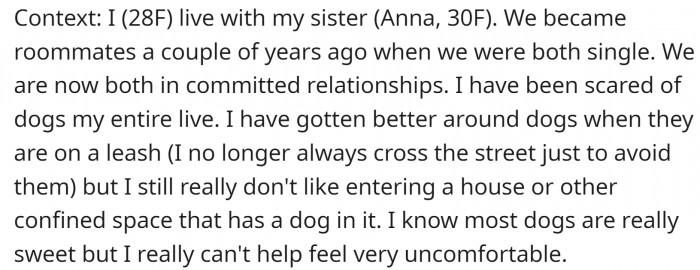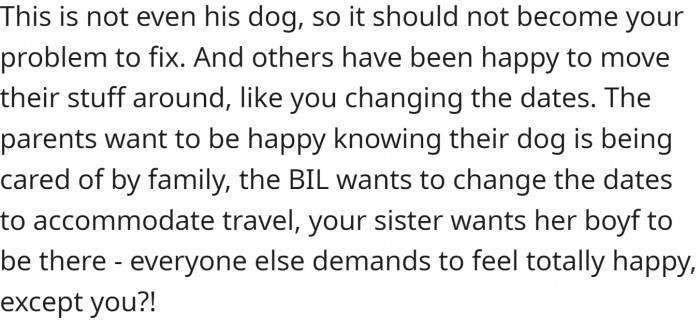Redditor Faces Family Judgment For Not Wanting Her BIL's Dog On Family Vacation She Planned And Organized
Fear of dogs is real, but dog owners don't seem to understand that.
It is inappropriate to force a dog on someone who is afraid of dogs or does not want to interact with them. It is not appropriate to force someone to do something. Period!
If someone in your family or group is afraid of dogs, leave the dog at home or make arrangements for the dog to be cared for while you are away.
If you decide to bring your dog with you on a family vacation (which is highly against common sense and morals), it is important to respect the boundaries and preferences of others. This may mean ensuring the dog is kept away from those who are afraid of them or who do not want to interact with them.
It is also important to consider the comfort and well-being of the dog, as being in unfamiliar environments can be stressful for some dogs. One Redditor shared her problem.
She asks: "AITA for not wanting my BIL to bring a dog on our family vacation?" They booked a family vacation with OP's parents, brother, and both sisters with their boyfriends.
They even changed the time to accommodate the sister and her boyfriend. However, the boyfriend wants to bring his mother's dog because she is going on vacation during the same period and doesn't have anyone to look after it.
OP doesn't want the dog there, as it would make her feel uncomfortable. But now everyone is saying she is being difficult.
Read the full story below:
OP asks:

She lives with her sister, and they are both in committed relationships. OP is very uncomfortable around dogs; she is even scared of them.

They booked a family vacation with OP's parents, brother, and both sisters with their boyfriends. They even changed the time to accommodate the sister and her boyfriend.

Understanding Fear and Anxiety
Dr. Alice Harper, a clinical psychologist at the University of Michigan, emphasizes the role of conditioned responses in developing phobias, such as fear of dogs.
Her studies indicate that early traumatic experiences or negative encounters can lead to long-lasting fear responses that persist into adulthood.
This type of emotional conditioning can trigger a fight-or-flight response, often causing individuals to avoid situations that remind them of their fears, even if those situations are safe.
However, the boyfriend wants to bring his mother's dog because she is going on vacation during the same period and doesn't have anyone to look after it.

OP doesn't want the dog there, as it would make her feel uncomfortable.

But now everyone is saying she is being difficult.

A behavioral psychologist notes that family dynamics can exacerbate feelings of anxiety, particularly when an individual feels judged or unsupported.
Research suggests that social support plays a critical role in managing fears and anxieties; feeling validated by loved ones can greatly reduce psychological distress.
In this case, the Redditor's reluctance to include her brother-in-law's dog on the vacation stems from a need to protect her mental well-being, which is a legitimate concern.
OP has offered the following explanation for why they think they might be the asshole.

OP should just stay home.

Being old isn't an excuse.

The Importance of Setting Boundaries
Setting healthy boundaries is crucial in maintaining one's mental health, particularly in family settings.
According to research published in the Journal of Family Psychology, individuals who articulate their boundaries often experience less anxiety and greater emotional stability.
In this situation, the Redditor's refusal to include the dog can be seen as a proactive measure to safeguard her emotional state, and it's essential for her to communicate this clearly to her family.
Is the rental even pet-friendly?

OP says:

She doesn't want to back out.

Studies show that individuals with anxiety disorders often feel pressured to conform to family expectations, which can worsen their symptoms.
A clinical psychologist specializing in anxiety highlights the need for individuals to advocate for their own mental health needs, especially during stressful family gatherings.
Encouraging open dialogues about fears can foster understanding and support among family members, potentially leading to more inclusive and empathetic interactions.
Dylan's mom has other options.

They are expecting OP to magically get over it.

This is not even his dog.

Coping Strategies for Anxiety Management
Experts recommend various coping strategies for managing fear and anxiety, such as exposure therapy, which gradually desensitizes individuals to their fears.
This approach might include controlled interactions with dogs, starting from a distance and slowly reducing that distance as comfort levels increase.
Additionally, mindfulness techniques, such as deep breathing and grounding exercises, can help individuals manage anxiety symptoms effectively in social situations.
Is the dog more important?

OP is arranging the whole trip.

OP has two options.

Family members can play a supportive role by acknowledging the individual's fears without judgment, fostering an environment where open conversations about anxiety are encouraged.
This can be achieved through family meetings or one-on-one discussions where each member shares their perspectives and feelings, paving the way for a deeper understanding of each other’s boundaries.
By normalizing these conversations, families can strengthen their bonds while respecting individual needs and experiences.
This is a great analogy:

Dogs usually do well with sitters.

OP deserves a relaxing vacation.

Seeking Professional Help
If anxiety related to pets or other triggers significantly impacts daily life, seeking professional help from a therapist can be beneficial.
Research indicates that therapy can provide tailored strategies that address specific fears and enhance coping mechanisms.
Therapists can also help individuals reframe their experiences and develop more adaptive responses to anxiety-inducing situations.
If you are planning a family vacation and are unsure about whether it is appropriate to bring your dog, it may be helpful to have a conversation with all members of the group to see how they feel about it. This can help ensure that everyone is comfortable and that the vacation is enjoyable for all.
Understanding that fear is a valid response and that each individual has unique triggers can foster empathy within family dynamics, leading to healthier relationships.
Families should strive to create spaces where vulnerability is met with compassion, allowing members to express their concerns without fear of judgment.
This not only benefits the individual but enhances overall family cohesion as well.
Psychological Analysis
This situation highlights the importance of recognizing individual differences in coping with anxiety, particularly in family settings.
It's essential for family members to respect these boundaries while also providing a supportive atmosphere that encourages open conversations about fears and anxieties.
Analysis generated by AI
Analysis & Alternative Approaches
Research from the American Psychological Association emphasizes the importance of understanding individual fears and creating supportive environments for open dialogue.
Effective communication and boundary-setting can alleviate anxiety and enhance family relationships.
Ultimately, fostering a culture of empathy within families can lead to healthier dynamics and improved mental health for all members.



